Literature Review: The Impact of COVID-19 on Overseas Filipino Workers
VerifiedAdded on 2023/06/12
|6
|2244
|323
Literature Review
AI Summary
This literature review examines the multifaceted challenges faced by Overseas Filipino Workers (OFWs) during the COVID-19 pandemic. It synthesizes findings from various sources, highlighting the economic hardships resulting from job losses and reduced incomes, the mental health strains caused by isolation and family concerns, and the communication barriers exacerbated by travel restrictions and time zone differences. The review also touches upon pre-existing issues such as infidelity and employer abuse, which were amplified during the crisis. Furthermore, it incorporates theoretical frameworks like psychoanalytic theory and functionalism to contextualize the impact of these challenges on OFW behavior and societal structures. Ultimately, the review underscores the resilience and adaptability of OFWs in navigating these unprecedented circumstances.
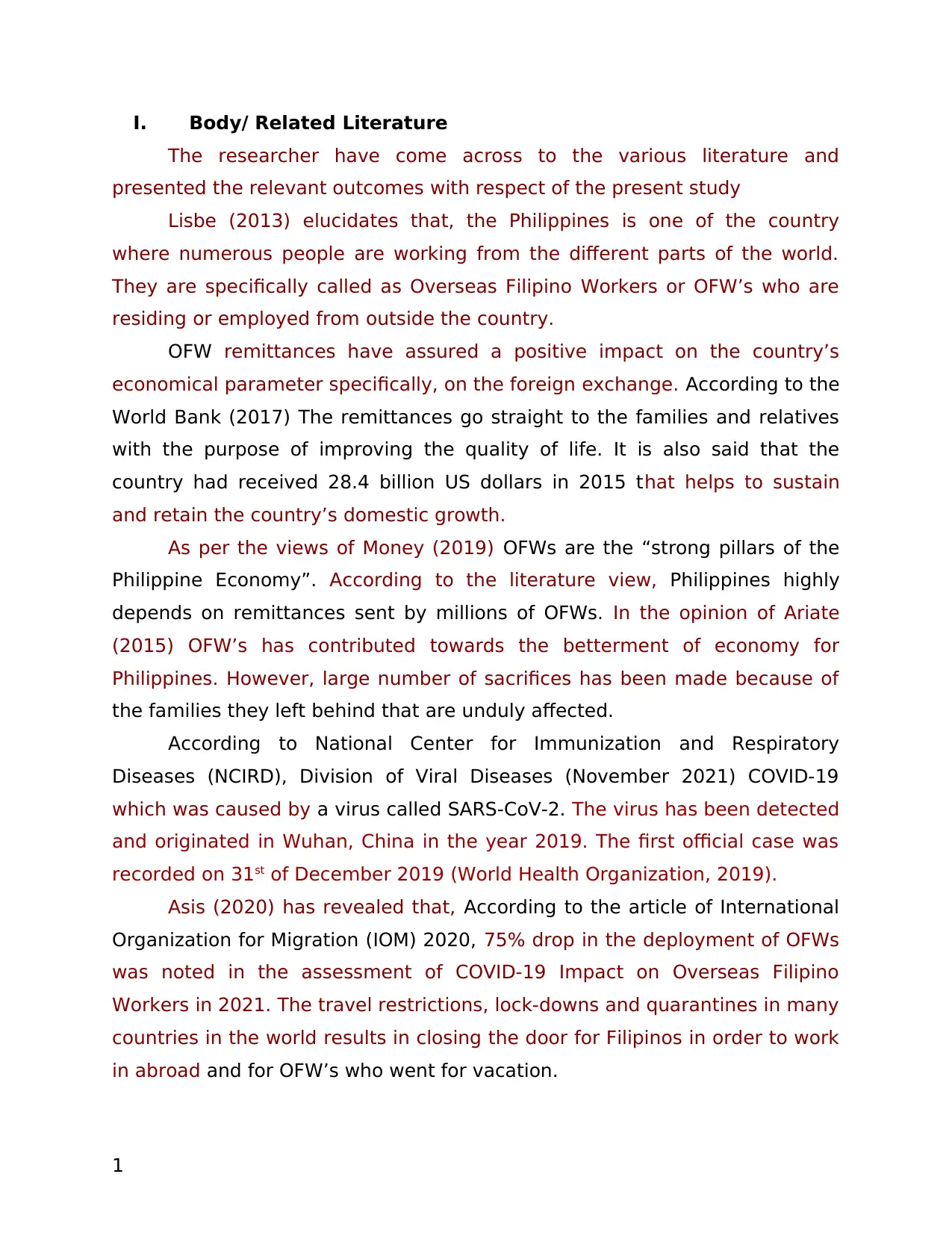
I. Body/ Related Literature
The researcher have come across to the various literature and
presented the relevant outcomes with respect of the present study
Lisbe (2013) elucidates that, the Philippines is one of the country
where numerous people are working from the different parts of the world.
They are specifically called as Overseas Filipino Workers or OFW’s who are
residing or employed from outside the country.
OFW remittances have assured a positive impact on the country’s
economical parameter specifically, on the foreign exchange. According to the
World Bank (2017) The remittances go straight to the families and relatives
with the purpose of improving the quality of life. It is also said that the
country had received 28.4 billion US dollars in 2015 that helps to sustain
and retain the country’s domestic growth.
As per the views of Money (2019) OFWs are the “strong pillars of the
Philippine Economy”. According to the literature view, Philippines highly
depends on remittances sent by millions of OFWs. In the opinion of Ariate
(2015) OFW’s has contributed towards the betterment of economy for
Philippines. However, large number of sacrifices has been made because of
the families they left behind that are unduly affected.
According to National Center for Immunization and Respiratory
Diseases (NCIRD), Division of Viral Diseases (November 2021) COVID-19
which was caused by a virus called SARS-CoV-2. The virus has been detected
and originated in Wuhan, China in the year 2019. The first official case was
recorded on 31st of December 2019 (World Health Organization, 2019).
Asis (2020) has revealed that, According to the article of International
Organization for Migration (IOM) 2020, 75% drop in the deployment of OFWs
was noted in the assessment of COVID-19 Impact on Overseas Filipino
Workers in 2021. The travel restrictions, lock-downs and quarantines in many
countries in the world results in closing the door for Filipinos in order to work
in abroad and for OFW’s who went for vacation.
1
The researcher have come across to the various literature and
presented the relevant outcomes with respect of the present study
Lisbe (2013) elucidates that, the Philippines is one of the country
where numerous people are working from the different parts of the world.
They are specifically called as Overseas Filipino Workers or OFW’s who are
residing or employed from outside the country.
OFW remittances have assured a positive impact on the country’s
economical parameter specifically, on the foreign exchange. According to the
World Bank (2017) The remittances go straight to the families and relatives
with the purpose of improving the quality of life. It is also said that the
country had received 28.4 billion US dollars in 2015 that helps to sustain
and retain the country’s domestic growth.
As per the views of Money (2019) OFWs are the “strong pillars of the
Philippine Economy”. According to the literature view, Philippines highly
depends on remittances sent by millions of OFWs. In the opinion of Ariate
(2015) OFW’s has contributed towards the betterment of economy for
Philippines. However, large number of sacrifices has been made because of
the families they left behind that are unduly affected.
According to National Center for Immunization and Respiratory
Diseases (NCIRD), Division of Viral Diseases (November 2021) COVID-19
which was caused by a virus called SARS-CoV-2. The virus has been detected
and originated in Wuhan, China in the year 2019. The first official case was
recorded on 31st of December 2019 (World Health Organization, 2019).
Asis (2020) has revealed that, According to the article of International
Organization for Migration (IOM) 2020, 75% drop in the deployment of OFWs
was noted in the assessment of COVID-19 Impact on Overseas Filipino
Workers in 2021. The travel restrictions, lock-downs and quarantines in many
countries in the world results in closing the door for Filipinos in order to work
in abroad and for OFW’s who went for vacation.
1
Paraphrase This Document
Need a fresh take? Get an instant paraphrase of this document with our AI Paraphraser
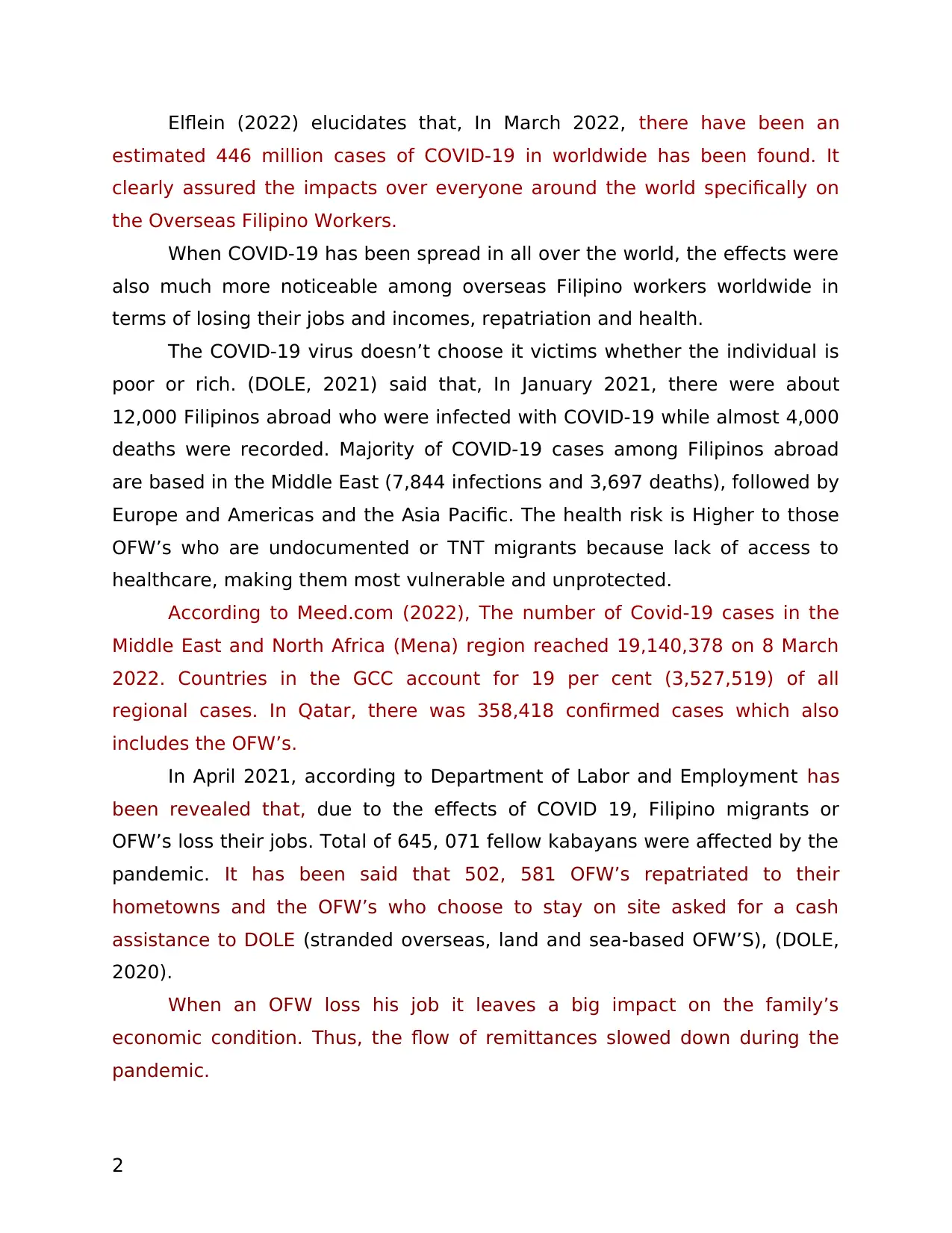
Elflein (2022) elucidates that, In March 2022, there have been an
estimated 446 million cases of COVID-19 in worldwide has been found. It
clearly assured the impacts over everyone around the world specifically on
the Overseas Filipino Workers.
When COVID-19 has been spread in all over the world, the effects were
also much more noticeable among overseas Filipino workers worldwide in
terms of losing their jobs and incomes, repatriation and health.
The COVID-19 virus doesn’t choose it victims whether the individual is
poor or rich. (DOLE, 2021) said that, In January 2021, there were about
12,000 Filipinos abroad who were infected with COVID-19 while almost 4,000
deaths were recorded. Majority of COVID-19 cases among Filipinos abroad
are based in the Middle East (7,844 infections and 3,697 deaths), followed by
Europe and Americas and the Asia Pacific. The health risk is Higher to those
OFW’s who are undocumented or TNT migrants because lack of access to
healthcare, making them most vulnerable and unprotected.
According to Meed.com (2022), The number of Covid-19 cases in the
Middle East and North Africa (Mena) region reached 19,140,378 on 8 March
2022. Countries in the GCC account for 19 per cent (3,527,519) of all
regional cases. In Qatar, there was 358,418 confirmed cases which also
includes the OFW’s.
In April 2021, according to Department of Labor and Employment has
been revealed that, due to the effects of COVID 19, Filipino migrants or
OFW’s loss their jobs. Total of 645, 071 fellow kabayans were affected by the
pandemic. It has been said that 502, 581 OFW’s repatriated to their
hometowns and the OFW’s who choose to stay on site asked for a cash
assistance to DOLE (stranded overseas, land and sea-based OFW’S), (DOLE,
2020).
When an OFW loss his job it leaves a big impact on the family’s
economic condition. Thus, the flow of remittances slowed down during the
pandemic.
2
estimated 446 million cases of COVID-19 in worldwide has been found. It
clearly assured the impacts over everyone around the world specifically on
the Overseas Filipino Workers.
When COVID-19 has been spread in all over the world, the effects were
also much more noticeable among overseas Filipino workers worldwide in
terms of losing their jobs and incomes, repatriation and health.
The COVID-19 virus doesn’t choose it victims whether the individual is
poor or rich. (DOLE, 2021) said that, In January 2021, there were about
12,000 Filipinos abroad who were infected with COVID-19 while almost 4,000
deaths were recorded. Majority of COVID-19 cases among Filipinos abroad
are based in the Middle East (7,844 infections and 3,697 deaths), followed by
Europe and Americas and the Asia Pacific. The health risk is Higher to those
OFW’s who are undocumented or TNT migrants because lack of access to
healthcare, making them most vulnerable and unprotected.
According to Meed.com (2022), The number of Covid-19 cases in the
Middle East and North Africa (Mena) region reached 19,140,378 on 8 March
2022. Countries in the GCC account for 19 per cent (3,527,519) of all
regional cases. In Qatar, there was 358,418 confirmed cases which also
includes the OFW’s.
In April 2021, according to Department of Labor and Employment has
been revealed that, due to the effects of COVID 19, Filipino migrants or
OFW’s loss their jobs. Total of 645, 071 fellow kabayans were affected by the
pandemic. It has been said that 502, 581 OFW’s repatriated to their
hometowns and the OFW’s who choose to stay on site asked for a cash
assistance to DOLE (stranded overseas, land and sea-based OFW’S), (DOLE,
2020).
When an OFW loss his job it leaves a big impact on the family’s
economic condition. Thus, the flow of remittances slowed down during the
pandemic.
2
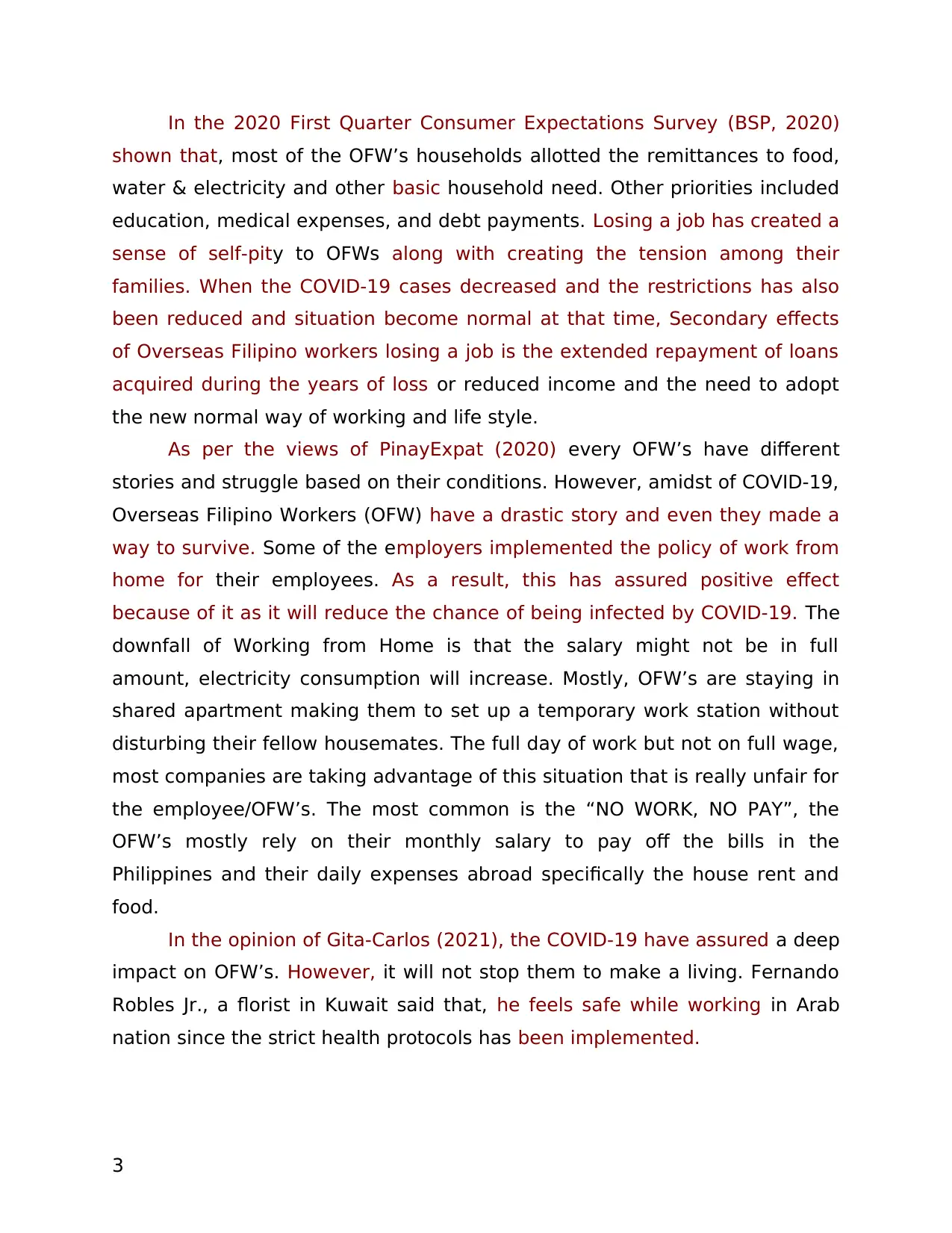
In the 2020 First Quarter Consumer Expectations Survey (BSP, 2020)
shown that, most of the OFW’s households allotted the remittances to food,
water & electricity and other basic household need. Other priorities included
education, medical expenses, and debt payments. Losing a job has created a
sense of self-pity to OFWs along with creating the tension among their
families. When the COVID-19 cases decreased and the restrictions has also
been reduced and situation become normal at that time, Secondary effects
of Overseas Filipino workers losing a job is the extended repayment of loans
acquired during the years of loss or reduced income and the need to adopt
the new normal way of working and life style.
As per the views of PinayExpat (2020) every OFW’s have different
stories and struggle based on their conditions. However, amidst of COVID-19,
Overseas Filipino Workers (OFW) have a drastic story and even they made a
way to survive. Some of the employers implemented the policy of work from
home for their employees. As a result, this has assured positive effect
because of it as it will reduce the chance of being infected by COVID-19. The
downfall of Working from Home is that the salary might not be in full
amount, electricity consumption will increase. Mostly, OFW’s are staying in
shared apartment making them to set up a temporary work station without
disturbing their fellow housemates. The full day of work but not on full wage,
most companies are taking advantage of this situation that is really unfair for
the employee/OFW’s. The most common is the “NO WORK, NO PAY”, the
OFW’s mostly rely on their monthly salary to pay off the bills in the
Philippines and their daily expenses abroad specifically the house rent and
food.
In the opinion of Gita-Carlos (2021), the COVID-19 have assured a deep
impact on OFW’s. However, it will not stop them to make a living. Fernando
Robles Jr., a florist in Kuwait said that, he feels safe while working in Arab
nation since the strict health protocols has been implemented.
3
shown that, most of the OFW’s households allotted the remittances to food,
water & electricity and other basic household need. Other priorities included
education, medical expenses, and debt payments. Losing a job has created a
sense of self-pity to OFWs along with creating the tension among their
families. When the COVID-19 cases decreased and the restrictions has also
been reduced and situation become normal at that time, Secondary effects
of Overseas Filipino workers losing a job is the extended repayment of loans
acquired during the years of loss or reduced income and the need to adopt
the new normal way of working and life style.
As per the views of PinayExpat (2020) every OFW’s have different
stories and struggle based on their conditions. However, amidst of COVID-19,
Overseas Filipino Workers (OFW) have a drastic story and even they made a
way to survive. Some of the employers implemented the policy of work from
home for their employees. As a result, this has assured positive effect
because of it as it will reduce the chance of being infected by COVID-19. The
downfall of Working from Home is that the salary might not be in full
amount, electricity consumption will increase. Mostly, OFW’s are staying in
shared apartment making them to set up a temporary work station without
disturbing their fellow housemates. The full day of work but not on full wage,
most companies are taking advantage of this situation that is really unfair for
the employee/OFW’s. The most common is the “NO WORK, NO PAY”, the
OFW’s mostly rely on their monthly salary to pay off the bills in the
Philippines and their daily expenses abroad specifically the house rent and
food.
In the opinion of Gita-Carlos (2021), the COVID-19 have assured a deep
impact on OFW’s. However, it will not stop them to make a living. Fernando
Robles Jr., a florist in Kuwait said that, he feels safe while working in Arab
nation since the strict health protocols has been implemented.
3
⊘ This is a preview!⊘
Do you want full access?
Subscribe today to unlock all pages.

Trusted by 1+ million students worldwide
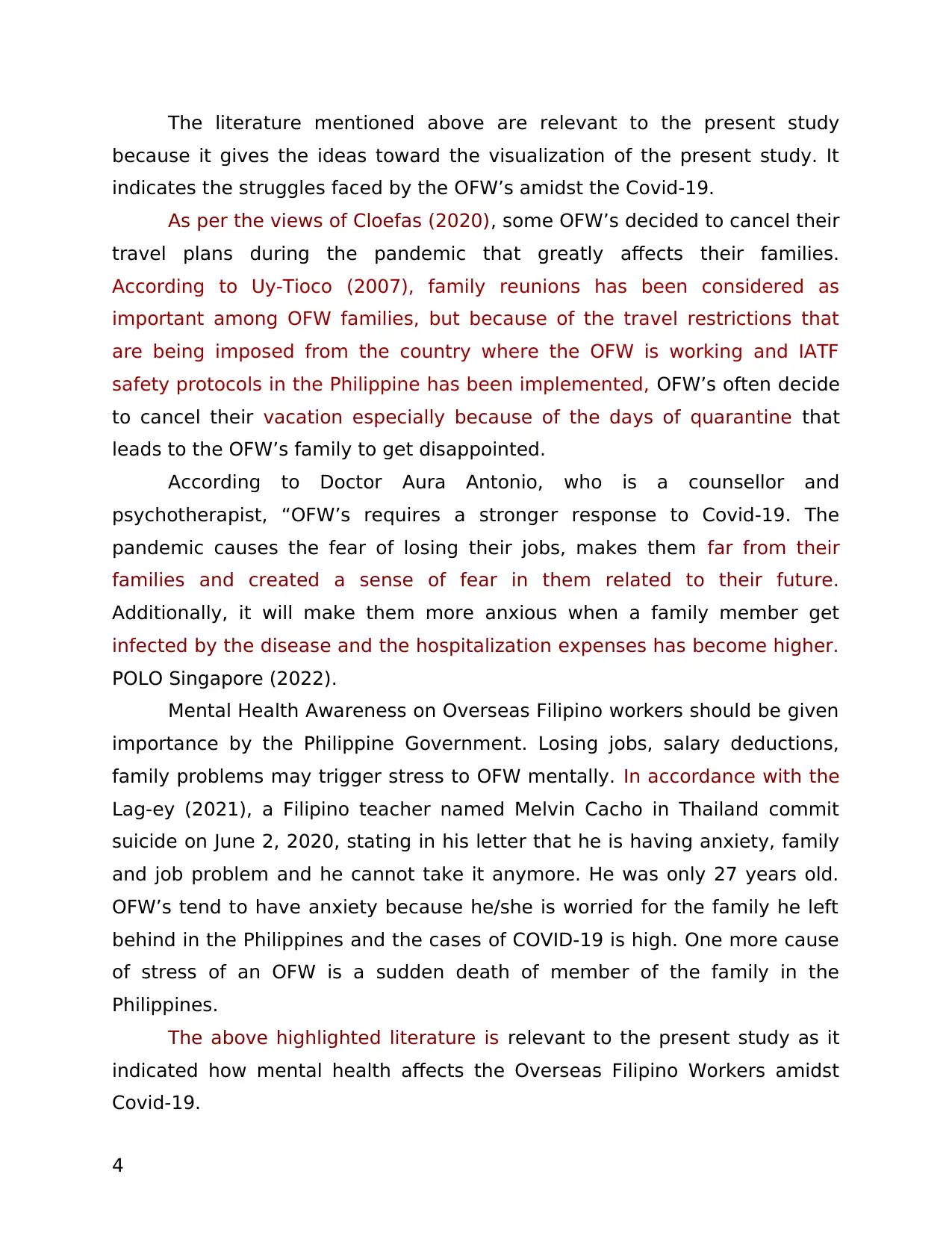
The literature mentioned above are relevant to the present study
because it gives the ideas toward the visualization of the present study. It
indicates the struggles faced by the OFW’s amidst the Covid-19.
As per the views of Cloefas (2020), some OFW’s decided to cancel their
travel plans during the pandemic that greatly affects their families.
According to Uy-Tioco (2007), family reunions has been considered as
important among OFW families, but because of the travel restrictions that
are being imposed from the country where the OFW is working and IATF
safety protocols in the Philippine has been implemented, OFW’s often decide
to cancel their vacation especially because of the days of quarantine that
leads to the OFW’s family to get disappointed.
According to Doctor Aura Antonio, who is a counsellor and
psychotherapist, “OFW’s requires a stronger response to Covid-19. The
pandemic causes the fear of losing their jobs, makes them far from their
families and created a sense of fear in them related to their future.
Additionally, it will make them more anxious when a family member get
infected by the disease and the hospitalization expenses has become higher.
POLO Singapore (2022).
Mental Health Awareness on Overseas Filipino workers should be given
importance by the Philippine Government. Losing jobs, salary deductions,
family problems may trigger stress to OFW mentally. In accordance with the
Lag-ey (2021), a Filipino teacher named Melvin Cacho in Thailand commit
suicide on June 2, 2020, stating in his letter that he is having anxiety, family
and job problem and he cannot take it anymore. He was only 27 years old.
OFW’s tend to have anxiety because he/she is worried for the family he left
behind in the Philippines and the cases of COVID-19 is high. One more cause
of stress of an OFW is a sudden death of member of the family in the
Philippines.
The above highlighted literature is relevant to the present study as it
indicated how mental health affects the Overseas Filipino Workers amidst
Covid-19.
4
because it gives the ideas toward the visualization of the present study. It
indicates the struggles faced by the OFW’s amidst the Covid-19.
As per the views of Cloefas (2020), some OFW’s decided to cancel their
travel plans during the pandemic that greatly affects their families.
According to Uy-Tioco (2007), family reunions has been considered as
important among OFW families, but because of the travel restrictions that
are being imposed from the country where the OFW is working and IATF
safety protocols in the Philippine has been implemented, OFW’s often decide
to cancel their vacation especially because of the days of quarantine that
leads to the OFW’s family to get disappointed.
According to Doctor Aura Antonio, who is a counsellor and
psychotherapist, “OFW’s requires a stronger response to Covid-19. The
pandemic causes the fear of losing their jobs, makes them far from their
families and created a sense of fear in them related to their future.
Additionally, it will make them more anxious when a family member get
infected by the disease and the hospitalization expenses has become higher.
POLO Singapore (2022).
Mental Health Awareness on Overseas Filipino workers should be given
importance by the Philippine Government. Losing jobs, salary deductions,
family problems may trigger stress to OFW mentally. In accordance with the
Lag-ey (2021), a Filipino teacher named Melvin Cacho in Thailand commit
suicide on June 2, 2020, stating in his letter that he is having anxiety, family
and job problem and he cannot take it anymore. He was only 27 years old.
OFW’s tend to have anxiety because he/she is worried for the family he left
behind in the Philippines and the cases of COVID-19 is high. One more cause
of stress of an OFW is a sudden death of member of the family in the
Philippines.
The above highlighted literature is relevant to the present study as it
indicated how mental health affects the Overseas Filipino Workers amidst
Covid-19.
4
Paraphrase This Document
Need a fresh take? Get an instant paraphrase of this document with our AI Paraphraser
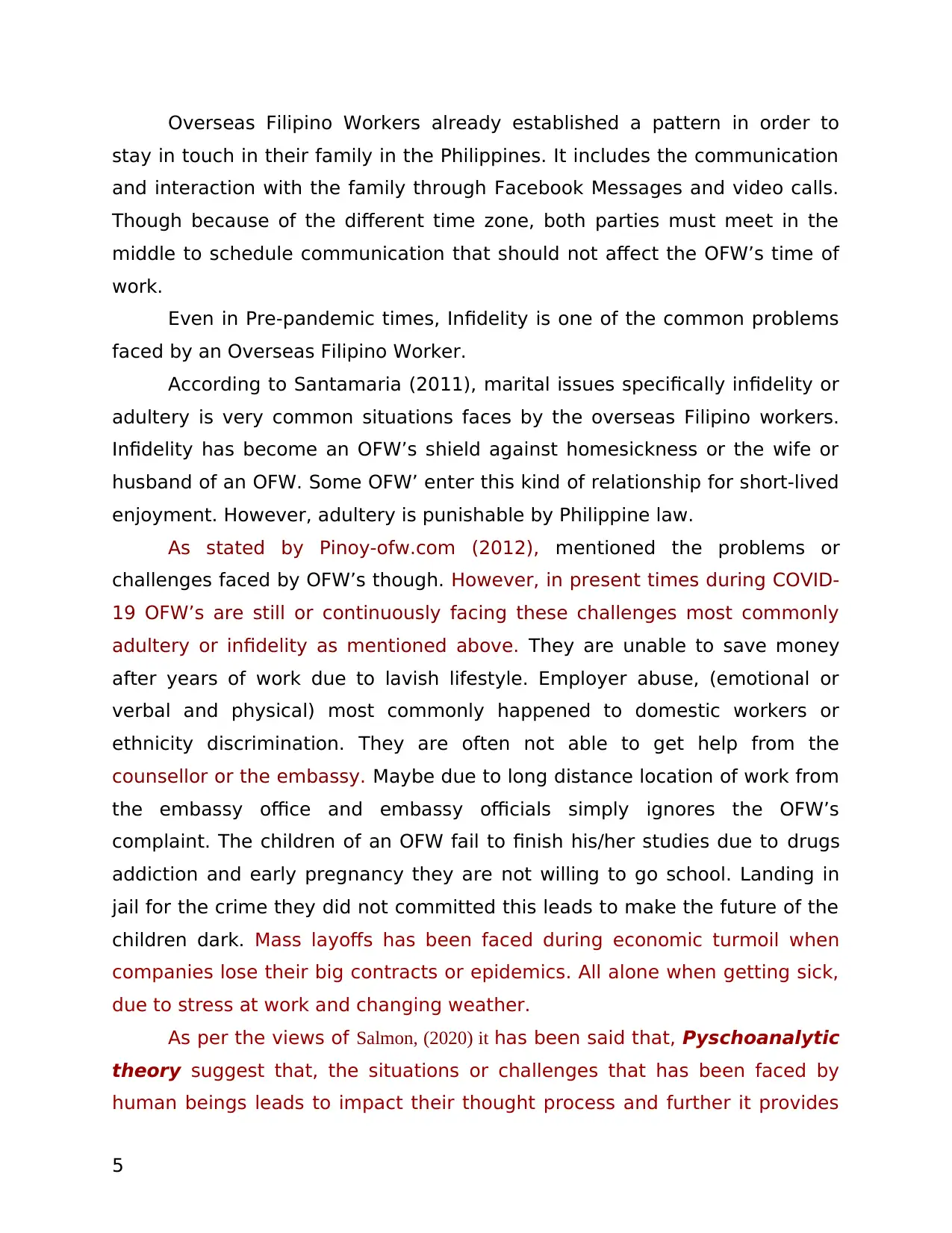
Overseas Filipino Workers already established a pattern in order to
stay in touch in their family in the Philippines. It includes the communication
and interaction with the family through Facebook Messages and video calls.
Though because of the different time zone, both parties must meet in the
middle to schedule communication that should not affect the OFW’s time of
work.
Even in Pre-pandemic times, Infidelity is one of the common problems
faced by an Overseas Filipino Worker.
According to Santamaria (2011), marital issues specifically infidelity or
adultery is very common situations faces by the overseas Filipino workers.
Infidelity has become an OFW’s shield against homesickness or the wife or
husband of an OFW. Some OFW’ enter this kind of relationship for short-lived
enjoyment. However, adultery is punishable by Philippine law.
As stated by Pinoy-ofw.com (2012), mentioned the problems or
challenges faced by OFW’s though. However, in present times during COVID-
19 OFW’s are still or continuously facing these challenges most commonly
adultery or infidelity as mentioned above. They are unable to save money
after years of work due to lavish lifestyle. Employer abuse, (emotional or
verbal and physical) most commonly happened to domestic workers or
ethnicity discrimination. They are often not able to get help from the
counsellor or the embassy. Maybe due to long distance location of work from
the embassy office and embassy officials simply ignores the OFW’s
complaint. The children of an OFW fail to finish his/her studies due to drugs
addiction and early pregnancy they are not willing to go school. Landing in
jail for the crime they did not committed this leads to make the future of the
children dark. Mass layoffs has been faced during economic turmoil when
companies lose their big contracts or epidemics. All alone when getting sick,
due to stress at work and changing weather.
As per the views of Salmon, (2020) it has been said that, Pyschoanalytic
theory suggest that, the situations or challenges that has been faced by
human beings leads to impact their thought process and further it provides
5
stay in touch in their family in the Philippines. It includes the communication
and interaction with the family through Facebook Messages and video calls.
Though because of the different time zone, both parties must meet in the
middle to schedule communication that should not affect the OFW’s time of
work.
Even in Pre-pandemic times, Infidelity is one of the common problems
faced by an Overseas Filipino Worker.
According to Santamaria (2011), marital issues specifically infidelity or
adultery is very common situations faces by the overseas Filipino workers.
Infidelity has become an OFW’s shield against homesickness or the wife or
husband of an OFW. Some OFW’ enter this kind of relationship for short-lived
enjoyment. However, adultery is punishable by Philippine law.
As stated by Pinoy-ofw.com (2012), mentioned the problems or
challenges faced by OFW’s though. However, in present times during COVID-
19 OFW’s are still or continuously facing these challenges most commonly
adultery or infidelity as mentioned above. They are unable to save money
after years of work due to lavish lifestyle. Employer abuse, (emotional or
verbal and physical) most commonly happened to domestic workers or
ethnicity discrimination. They are often not able to get help from the
counsellor or the embassy. Maybe due to long distance location of work from
the embassy office and embassy officials simply ignores the OFW’s
complaint. The children of an OFW fail to finish his/her studies due to drugs
addiction and early pregnancy they are not willing to go school. Landing in
jail for the crime they did not committed this leads to make the future of the
children dark. Mass layoffs has been faced during economic turmoil when
companies lose their big contracts or epidemics. All alone when getting sick,
due to stress at work and changing weather.
As per the views of Salmon, (2020) it has been said that, Pyschoanalytic
theory suggest that, the situations or challenges that has been faced by
human beings leads to impact their thought process and further it provides
5
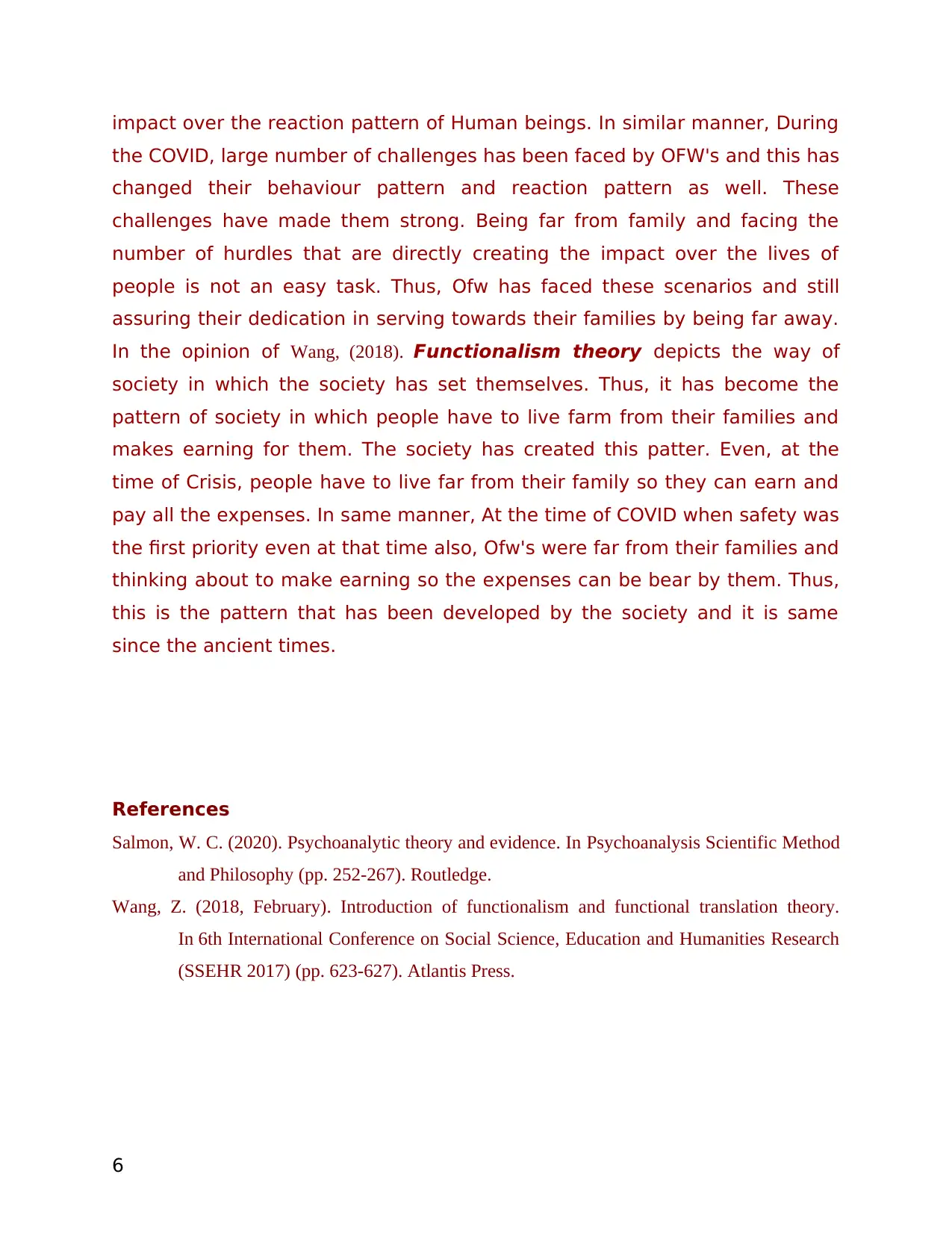
impact over the reaction pattern of Human beings. In similar manner, During
the COVID, large number of challenges has been faced by OFW's and this has
changed their behaviour pattern and reaction pattern as well. These
challenges have made them strong. Being far from family and facing the
number of hurdles that are directly creating the impact over the lives of
people is not an easy task. Thus, Ofw has faced these scenarios and still
assuring their dedication in serving towards their families by being far away.
In the opinion of Wang, (2018). Functionalism theory depicts the way of
society in which the society has set themselves. Thus, it has become the
pattern of society in which people have to live farm from their families and
makes earning for them. The society has created this patter. Even, at the
time of Crisis, people have to live far from their family so they can earn and
pay all the expenses. In same manner, At the time of COVID when safety was
the first priority even at that time also, Ofw's were far from their families and
thinking about to make earning so the expenses can be bear by them. Thus,
this is the pattern that has been developed by the society and it is same
since the ancient times.
References
Salmon, W. C. (2020). Psychoanalytic theory and evidence. In Psychoanalysis Scientific Method
and Philosophy (pp. 252-267). Routledge.
Wang, Z. (2018, February). Introduction of functionalism and functional translation theory.
In 6th International Conference on Social Science, Education and Humanities Research
(SSEHR 2017) (pp. 623-627). Atlantis Press.
6
the COVID, large number of challenges has been faced by OFW's and this has
changed their behaviour pattern and reaction pattern as well. These
challenges have made them strong. Being far from family and facing the
number of hurdles that are directly creating the impact over the lives of
people is not an easy task. Thus, Ofw has faced these scenarios and still
assuring their dedication in serving towards their families by being far away.
In the opinion of Wang, (2018). Functionalism theory depicts the way of
society in which the society has set themselves. Thus, it has become the
pattern of society in which people have to live farm from their families and
makes earning for them. The society has created this patter. Even, at the
time of Crisis, people have to live far from their family so they can earn and
pay all the expenses. In same manner, At the time of COVID when safety was
the first priority even at that time also, Ofw's were far from their families and
thinking about to make earning so the expenses can be bear by them. Thus,
this is the pattern that has been developed by the society and it is same
since the ancient times.
References
Salmon, W. C. (2020). Psychoanalytic theory and evidence. In Psychoanalysis Scientific Method
and Philosophy (pp. 252-267). Routledge.
Wang, Z. (2018, February). Introduction of functionalism and functional translation theory.
In 6th International Conference on Social Science, Education and Humanities Research
(SSEHR 2017) (pp. 623-627). Atlantis Press.
6
⊘ This is a preview!⊘
Do you want full access?
Subscribe today to unlock all pages.

Trusted by 1+ million students worldwide
1 out of 6
Related Documents
Your All-in-One AI-Powered Toolkit for Academic Success.
+13062052269
info@desklib.com
Available 24*7 on WhatsApp / Email
![[object Object]](/_next/static/media/star-bottom.7253800d.svg)
Unlock your academic potential
Copyright © 2020–2026 A2Z Services. All Rights Reserved. Developed and managed by ZUCOL.




